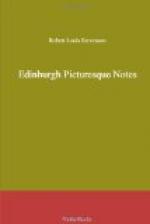Another legend is that of the two maiden sisters. A legend I am afraid it may be, in the most discreditable meaning of the term; or perhaps something worse — a mere yesterday’s fiction. But it is a story of some vitality, and is worthy of a place in the Edinburgh kalendar. This pair inhabited a single room; from the facts, it must have been double-bedded; and it may have been of some dimensions: but when all is said, it was a single room. Here our two spinsters fell out — on some point of controversial divinity belike: but fell out so bitterly that there was never a word spoken between them, black or white, from that day forward. You would have thought they would separate: but no; whether from lack of means, or the Scottish fear of scandal, they continued to keep house together where they were. A chalk line drawn upon the floor separated their two domains; it bisected the doorway and the fireplace, so that each could go out and in, and do her cooking, without violating the territory of the other. So, for years, they coexisted in a hateful silence; their meals, their ablutions, their friendly visitors, exposed to an unfriendly scrutiny; and at night, in the dark watches, each could hear the breathing of her enemy. Never did four walls look down upon an uglier spectacle than these sisters rivalling in unsisterliness. Here is a canvas for Hawthorne to have turned into a cabinet picture — he had a Puritanic vein, which would have fitted him to treat this Puritanic horror; he could have shown them to us in their sicknesses and at their hideous twin devotions, thumbing a pair of great Bibles, or praying aloud for each other’s penitence with marrowy emphasis; now each, with kilted petticoat, at her own corner of the fire on some tempestuous evening; now sitting each at her window, looking out upon the summer landscape sloping far below them towards the firth, and the field-paths where they had wandered hand in hand; or, as age and infirmity grew upon them and prolonged their toilettes, and their hands began to tremble and their heads to nod involuntarily, growing only the more steeled in enmity with years; until one fine day, at a word, a look, a visit, or the approach of death, their hearts would melt and the chalk boundary be overstepped for ever.
Alas! to those who know the ecclesiastical history of the race — the most perverse and melancholy in man’s annals — this will seem only a figure of much that is typical of Scotland and her high-seated capital above the Forth — a figure so grimly realistic that it may pass with strangers for a caricature. We are wonderful patient haters for conscience sake up here in the North. I spoke, in the first of these papers, of the Parliaments of the Established and Free Churches, and how they can hear each other singing psalms across the street. There is but a street between them in space, but a shadow between them in principle;




